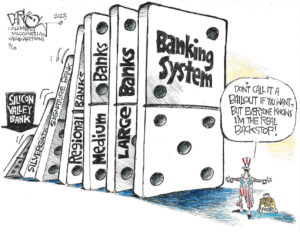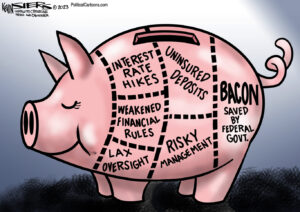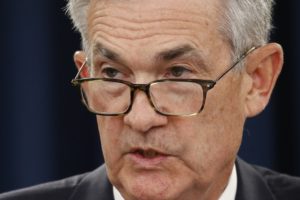A Bad Fix Would Be No Fix
Advice to solve the financial crisis before even thinking about health care, energy or education is either misguided or disingenuous. Fortunately, Obama seems to be ignoring all the chatter.Shouting “socialism” didn’t work, so now they’re yelling “overload” and “lack of focus.” Critics of the Obama administration counsel the president and his aides to spend every waking hour — and every available dollar, including stray coins found behind the cushions of the Oval Office couch — on the paralyzing financial crisis. What these critics really want, though, is to delay or derail the progressive reforms that voters elected President Obama to carry out.
Advice to “fix” the financial system before even thinking about health care, energy or education is either misguided or disingenuous. Fortunately, Obama seems to be ignoring all the chatter. This isn’t about Rahm Emanuel’s too-cute admonition not to “waste” a good crisis. It’s about honoring a clear mandate.
The banking meltdown is a genuine emergency, to put it mildly. But the worst thing Obama could do would be to allow the baying titans of Wall Street, the conservative commentariat and the overcaffeinated infotainers who “cover” the financial world on cable television to stampede him into premature, half-baked action. The last thing anyone needs is a new, multitrillion-dollar bailout for the banks — recapitalization, nationalization, receivership, whatever you call it — that turns out to be no more definitive than all the other bailouts we’ve tried.
Wall Street’s impatience is understandable; the geniuses of Lower Manhattan just want to get back to business as usual, having failed to notice that business as usual is no longer remotely acceptable. Obama’s political opponents have a subtler motive: to occupy, exhaust and impoverish the administration, making its promised domestic initiatives impossible.
The “overload” criticism makes sense until you think about it. There is general agreement that our system of health care, which leaves 46 million Americans uninsured, is unfair, wasteful and ruinously expensive. Anyone with a pocket calculator can see that as the baby boomers retire and become intimately familiar with the infirmities of old age, Medicare costs will bankrupt the Treasury. Waiting to tackle the problem will only make an eventual fix more expensive and more disruptive.
So the loudest complainers — Republicans who claim to stand for fiscal prudence, business leaders who claim to be able to read a balance sheet — ought to be the biggest cheerleaders for Obama’s decision to make a 10-year, $634 billion “down payment” on reform. But they don’t like the fact that Obama wants to fund that down payment, in part, by returning tax rates for the wealthy to the reasonable levels that were in place during the boom years of the Clinton administration.
Politically, there are no winning arguments against fixing health care or reversing the tax-cutting excesses of the Bush administration. A more promising tactic for critics is to attack the administration for trying to do too much and taking its eye off the ball.
I would argue that a laser-like focus on the financial crisis, to the exclusion of everything else, would be unlikely to improve the situation and might actually make things worse. Given that we’ve already poured well over $1 trillion into the financial system, so far to minimal effect, how can anyone be confident that dumping in, say, another $2 trillion would magically turn things around? Do those who blithely argue for nationalizing Citigroup have any sense of how complicated that would be? Do the administration’s critics really want our government to run a huge chunk of the banking sector, or do they just want Obama to be bogged down in a financial Vietnam?
I’ve been critical of the administration for a lack of transparency in handling the Wall Street crisis — officials should level with us about which banks are insolvent and which aren’t, and about the size of the overall problem. But I don’t fault the White House or the Treasury for a lack of haste. If there were an obvious, guaranteed solution, we’d know it by now. Unfortunately, there isn’t.
One way or another, we’re going to borrow an obscene amount of money — mostly from China and the Persian Gulf states — to try to put the economy on a sustainable footing. Here’s the real question: Do we throw all that money into the apparently bottomless pit of Wall Street’s irresponsibility and greed? Or do we spend some of it on initiatives that would make the American people healthier, better educated and less dependent on foreign oil — and that, in the long run, should make us all more prosperous?
Tell me, what is the real distraction?
Eugene Robinson’s e-mail address is eugenerobinson(at)washpost.com.
© 2009, Washington Post Writers Group
Your support matters…Independent journalism is under threat and overshadowed by heavily funded mainstream media.
You can help level the playing field. Become a member.
Your tax-deductible contribution keeps us digging beneath the headlines to give you thought-provoking, investigative reporting and analysis that unearths what's really happening- without compromise.
Give today to support our courageous, independent journalists.




You need to be a supporter to comment.
There are currently no responses to this article.
Be the first to respond.